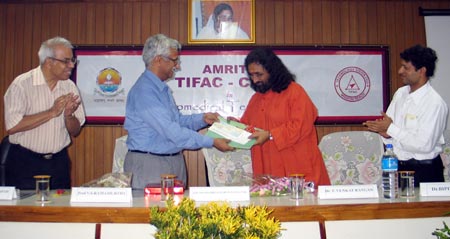21 May 2005 — Amritapuri University, Amritapuri Campus
The first TIFAC-CORE in Biomedical Technology, Amrita TIFAC-CORE, was inaugurated at the Amritapuri Campus of Amrita Vishwa Vidyapeetham on Saturday by the secretary of India’s Department of Science & Technology, Professor V. Ramamurthy.

Dean of Amrita University Mr. Nambootiri, Professor V. Ramamurthy of Department of Science & Technology, Swami Amritaswarupananda, Vice Chancellor P. Venkat Rangan during the inaugural function of Amrita -TIFAC CORE.
The Technology Information, Forecasting & Assessment Council (TIFAC) of the Department of Science & Technology was set up in 2000 to pioneer research in the emerging advanced areas of science and technology, as part of President Kalam’s Technology Vision 2020 objectives. It also aims to create an environment to produce world-class manpower to work on technologies and solutions that are of direct relevance to India. As part of this objective, TIFAC identifies institutions for developing “Centres of Relevance and Excellence” (COREs), carrying out focused research in critical areas.
The Centre for Biotechnology, School of Applied Sciences at Amrita Vishwa Vidyapeetham, Amritapuri, Kollam, Kerala, has been identified by TIFAC as a CORE in Biomedical Technology. Amrita was identified as a CORE primarily due to its established strengths and capabilities in diverse disciplines of engineering, medicine, information technology and basic sciences.
Amrita TIFAC-CORE will pioneer interdisciplinary education and research in biomedical technology in collaboration with the industry and the government. The total investment for the CORE over a period of three years is estimated at around Rs. 8.4 crores to be funded through the collaboration.
The immediate objective of the CORE is to develop biocompatible materials and devices for medical applications in the treatment of diabetes and related diseases, as Kerala has one of the highest diabetes rates in the world. Biomedical technology is still at its nascent stage in India and is expected to substantially influence the ongoing development towards improving medical devices and developing new drugs for reducing human suffering due to diseased states.
Amrita Centre for Biotechnology, set up in 2004 at Amritapuri Campus, an integral part of the CORE, offers academic programmes in the areas of biotechnology and bioinformatics. The Centre is well-equipped with state-of-the-art facilities and other advanced instrumentation and has already succeeded in attracting experienced academics and researchers from India and abroad to work on pertinent research areas.
